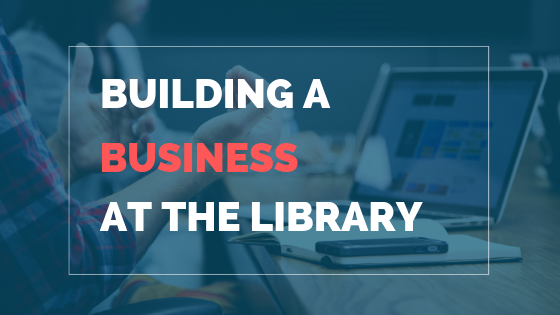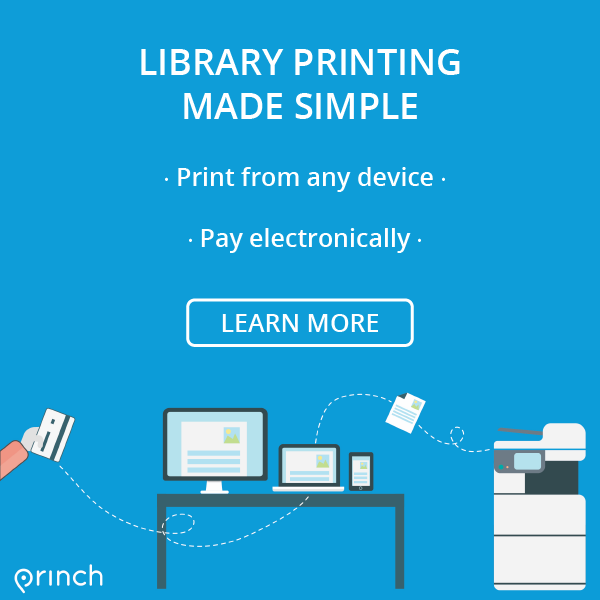When someone is looking to develop their business, libraries do not tend to be the first choice as the place to get the help or answers they are looking for. However, libraries offer everything from seminars, useful resources, comfy working spaces as well as feedback and advice from your well informed librarian. The library should be your first choice when looking to develop and support your business.
In this week’s post, author Thomas Vose discusses how libraries support businesses. The original article is by Thomas Vose for EveryLibrary called Libraries and the Business Community: A success story.
Libraries exist to help people succeed, and the business world is no exception. Many aspiring business owners got their start in a public library, whether through researching how to write a business plan, attending a class on QuickBooks, or developing a marketing list using the library’s electronic resources.
The following is an amazing example of how libraries can help you develop your business ideas, taken from an interview with Morgan Miller, Director, and Laura Metzler, Business Librarian, at the Cecil County Public Library, Maryland. Cecil County’s library system has developed a great relationship with its business community and has done wonders for encouraging entrepreneurship in their region— check out these testimonials to see the success stories that can come from such a partnership!
Many aspiring business owners got their start in a public library, whether through researching how to write a business plan, attending a class on QuickBooks, or developing a marketing list using the library’s electronic resources. Share on XWhy would businesses turn to libraries?
Morgan: We help people in the dream stage — where do you go when all you have is an idea? The bank won’t help. If you have no business plan or marketing plan you need someone to hold your hand and give you the information you need to get there. Libraries are well equipped to do that — we have resources, research expertise, and are well networked in the community. A report from the American Library Association describes how libraries advance small business as the “People’s Incubator,” giving a great history of how they have been doing this for a long time, ever since the Philadelphia Free Library, created by one of the founding fathers of the United States, Benjamin Franklin. He brought together artisans and tradesmen to develop growth for business. The concept of public libraries focusing their unique resources to advance businesses may sound like a new idea, but it dates back to the colonial days of the US.
What inspired this initiative?
Morgan: The program began in 2003 when the director and staff started to see that we had more and more people walking up to the reference desk asking how to start a business. CCPL applied for an Library Services and Technology Act (LSTA) grant to launch the Small Business Information Center(SBIC) and hire a full-time business librarian.
The SBIC connects entrepreneurs with information, data and the research they need to launch and grow their business. Before people can go to the Economic Development Department or go to a bank for financing they need a business plan — where do you go? How do you do it? How do you perform a competitor analysis and develop a marketing plan? We have a research librarian with business expertise and have databases that support that librarian with their research. We also work with industry experts to provide programs on topics like Quickbooks, social media marketing, launching an Etsy business, etc., to provide a complete network of information support. We’re part of a group called Cecil Business Resource Partners comprised of the Library, the Chamber of Commerce, Cecil College, the Susquehanna Workforce Center, the Office of Economic Development, the Business Education Partnership Advisory Council, and the Small Business Development Corporation — as such, we can refer people easily to partners, making the library the gateway.
The County’s Director of Economic Development was a great partner in advocating for this position. While his office is focused on bringing large corporations like Amazon to the County, he believes the library is perfectly positioned to help uncover aspiring small business owners and entrepreneurs who are like “needles in a haystack” and give them the support to help take advantage of the resources his office provides. A council member even asked him “Why not use a member of the Economic Development Department to provide this service?” He replied: “They wouldn’t have the critical research expertise of a librarian.”
Want to start your own business, but not sure where to begin? Join us at 1 p.m. Tuesday, Feb. 12, at the Library Center in Meeting Room A as experienced accounting professional Cyndy Elworth will walk you through how to get one started on the right foot. Call 986-4730 to register pic.twitter.com/YzzeF2e4q1
— The Library (@springfieldlib) February 9, 2019
Who have been your partners in developing these programs?
Morgan: In the initial stages, SCORE, the Senior Core of Retired Executives- was an excellent partner. The Office of Economic Development has been one of the strongest partners as well and recognized the value and impact of what the library was doing early on to create a continuum of support for entrepreneurs in the County. The business community itself is a partner as well. They are wonderful advocates, and many have led business programs for the library and advocated for funding support.
We held a focus group of 60 businesses, and those businesses went on to hire 78 new employees.
First, I would say that it is definitely not intuitive for people thinking of starting a business to start at the library. Share on XLaura: First, I would say that it is definitely not intuitive for people thinking of starting a business to start at the library. I think it is paramount that you develop key partnerships. This was not necessarily easy for us to do at first. I met multiple times with the Office of Economic Development and literally had to take my computer and show them how to access Reference USA, Demographics Now, Lynda.com, Gale Courses and the Small Business Resource Center. I gave their employees a tutorial of how to use them and even had testimonials/success stories of patrons that used our resources to start their business. I did this for the chambers of commerce in our county, too. Once they saw that we were a key player, we were taken seriously, and a lot of doors started to open. I was invited to speak at chamber luncheons, rotary meetings, business networking groups, and even teach one night a semester at an entrepreneurship class at the local community college. Instead of creating a long drawn out PowerPoint on how to start a business, we created this infographic to share. That has worked really well for us. The library is a comfortable place for nascent-stage entrepreneurs to visit and ask questions and find out what steps need to be taken. Staying active in organizations has also been important. I attend chamber luncheons regularly and I am on the government relations committee.
What has been your greatest achievement with this initiative?
Morgan: Being an active engaged partner helping citizens achieve their vision of success. See the testimonial video on our website — we’ve had businesses launch and then come back to us to get more information about things like hiring staff or getting help with marketing — we’re very proud of relationships that have gone through the life cycle of a business, not just the start-up stage. We’re proud of being not just a partner but a community leader in advancing the economy and business community.
Laura: This is an awesome example of a success story we have had at the library’s Small Business Information Center:
Libraries Changing the World: From Cecil County Public Library to Mount Kilimanjaro from CecilCountyPublicLibrary on Vimeo.
If you were in charge, what would you ensure that all libraries did for their business community?
Laura: I think tailoring their services to the needs of the community is key. For example, I used to do general “start your own business” courses. I showcased the process of starting a business and highlighted our resources. But when I focused this type of assistance in a one-on-one personal meeting with the patron, and helped them individually research their business, it seemed to give them the personal guidance and assistance they needed. I then asked local experts in the community to give programs on specific topics — for example, I have a CPA do QuickBooks programs for us. I asked another accountant to discuss tax information for small businesses during tax season. I am using a digital marketing expert to talk about strategizing Facebook posts for small business owners. Next month, I have someone coming in to discuss starting a food business, covering topics like what can legally be made in a home kitchen versus a commercial kitchen. I find tailored programming from experts, that patrons would normally have to pay for, extremely successful.
Here is a link to the WebJunction webinar I gave on this topic.
Thanks to hardworking and innovative people like Laura and Morgan, Cecil County’s business community has a leg up in the marketplace and is connected to classes and experts that simplify the often-arcane process of starting a small business. Your library exists to serve you — how can it help you bring your business dream to life?
Author Thomas Vose discusses how libraries support businesses. The original article is by Thomas Vose for EveryLibrary. The article is called Libraries and the Business Community: A success story.
Recent posts
Enhancing User Experience For Libraries In The Digital Age
In this week's Princh Library Blog post, recurring guest writer Sam L. Bowman covers how your library can improve the user experience on [...]
Library Password Practices—Balancing Accessibility and Security
In this week's Princh Library Blog, recurring guest writer Nina Grant discusses a basic, but nevertheless crucial digital security principle: secure password [...]




Leave A Comment